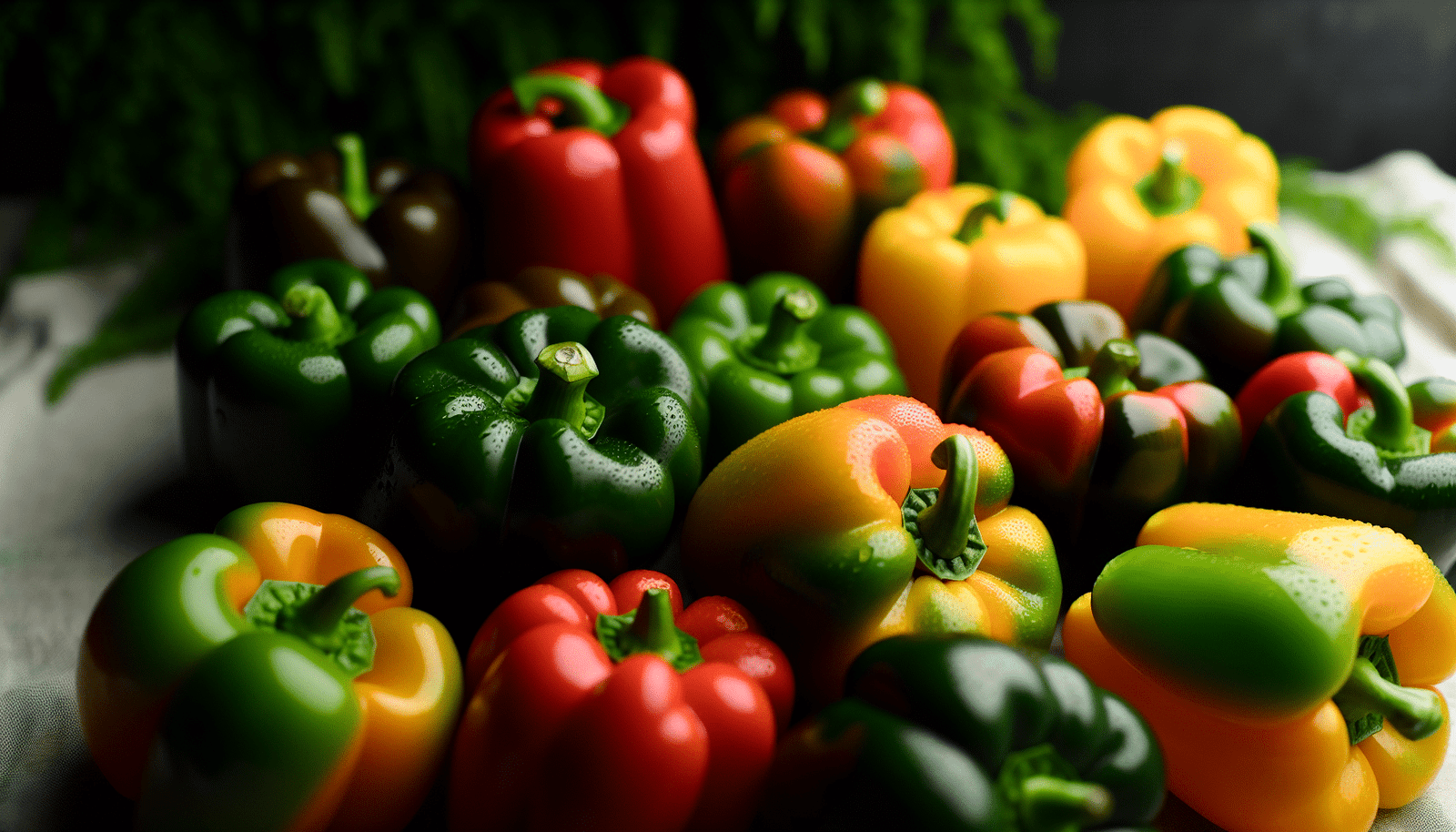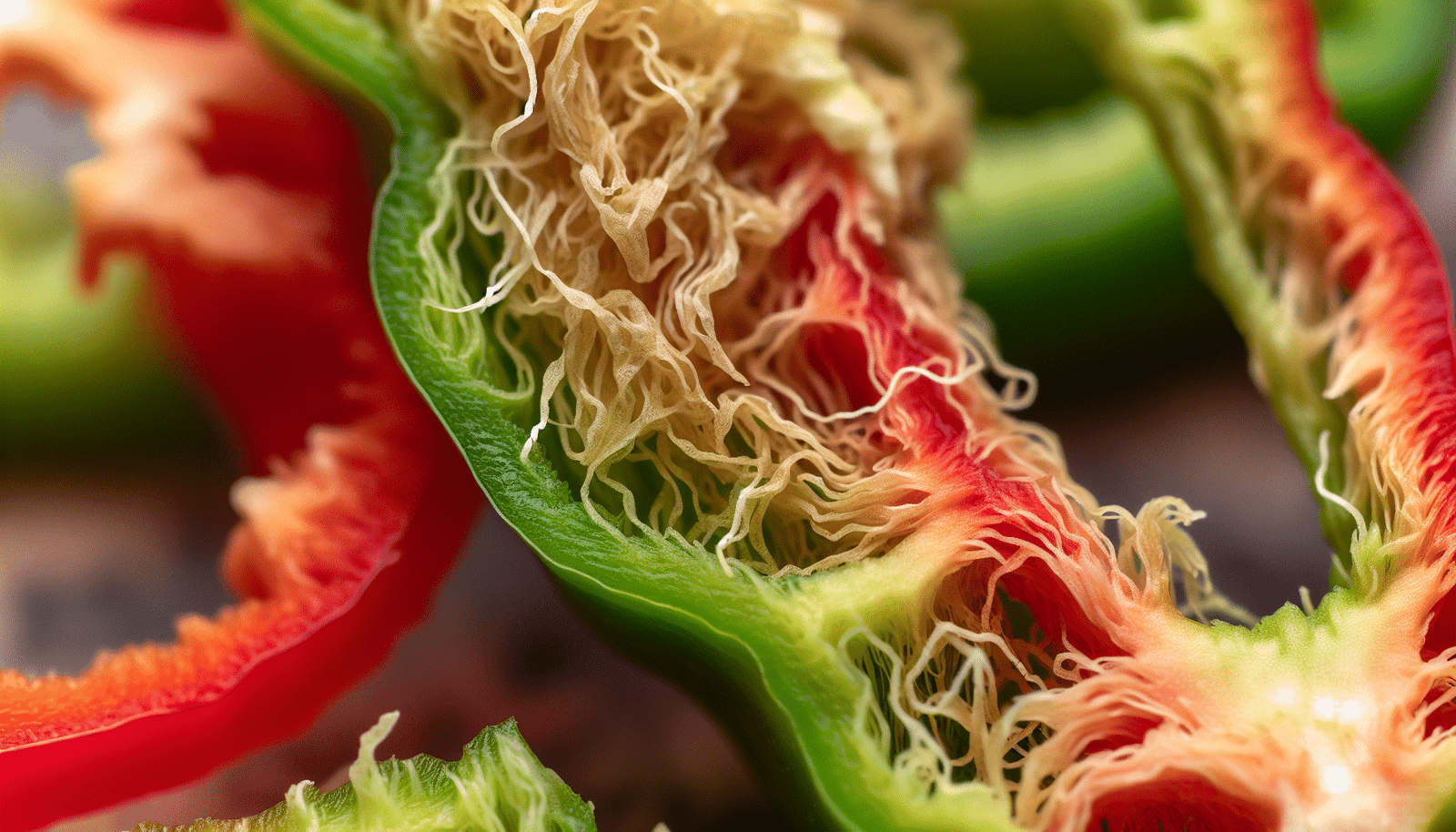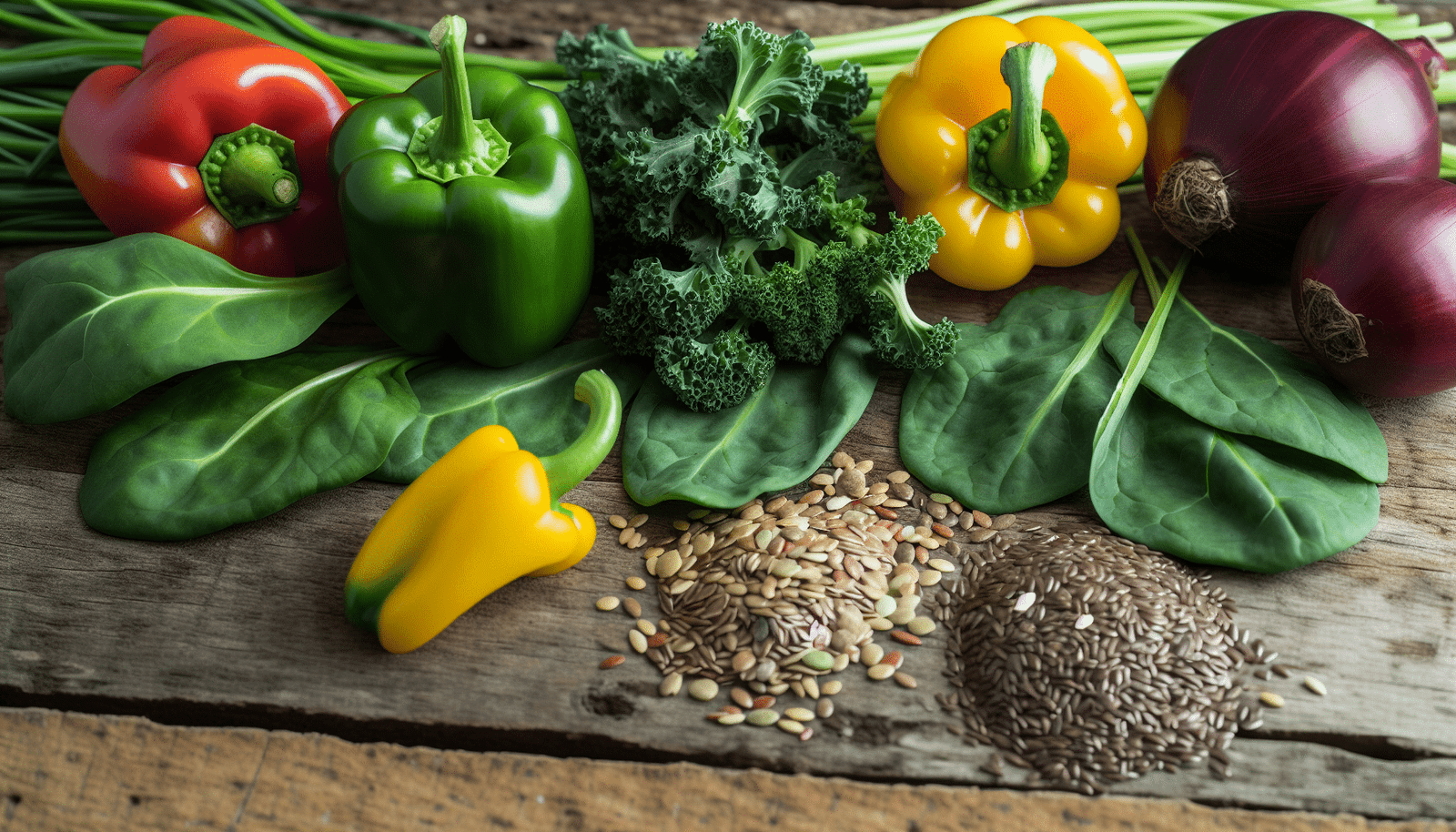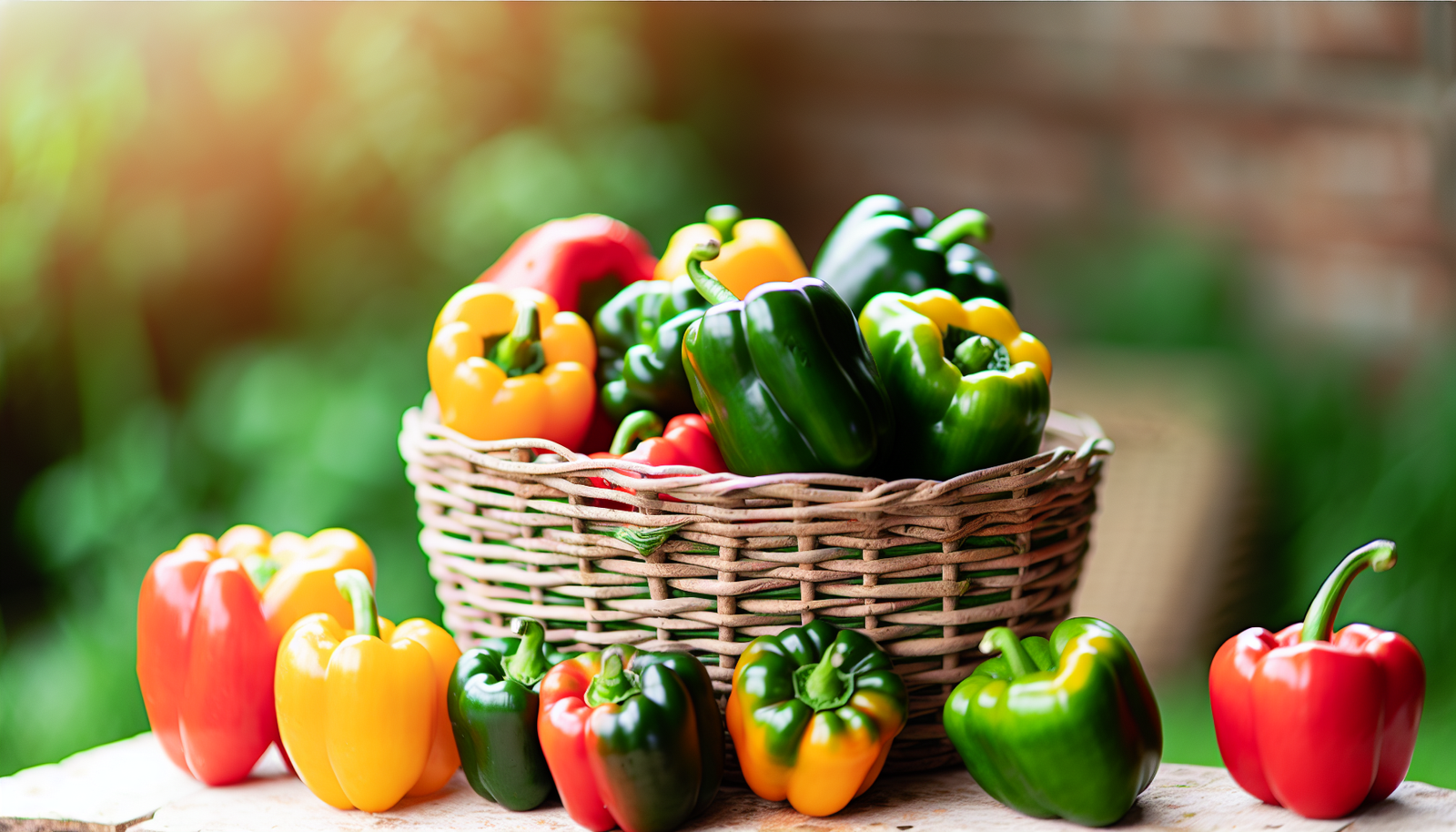If you’re pondering, ‘Can bunnies eat bell peppers,’ the answer is a reassuring yes. Rabbits can safely enjoy the occasional bell pepper treat, providing both variety and essential nutrients to their diet. This article will guide you through the benefits and recommended moderation to keep your rabbit nibbling happily.
Key Takeaways
- Bell peppers are a healthy, nutrient-rich treat for rabbits, packed with vitamin C, fiber, and essential minerals, and safe in all colors when served in moderation.
- Feeding guidelines for rabbits suggest bell peppers should be a small part of the diet; introduce them gradually, raw, and in small pieces, avoiding seeds, cores, and leaves.
- Spicy peppers are harmful to rabbits, variety in diet is vital, and you should monitor your rabbit for any signs of intolerance or allergies when introducing new foods.
Bell Peppers and Rabbits: A Nutritious Treat

Bell peppers aren’t just a vibrant addition to our salads; they’re a nutritional powerhouse for rabbits too. These crunchy vegetables come packed with essential nutrients that can support your rabbit’s health from the whiskers to the tail. They help keep the digestive system running smoothly, preventing pesky issues like constipation or diarrhea, and even play a role in eradicating harmful bacteria. Plus, adding bell peppers to your bunny’s diet could mean a boost for their nervous system, keeping neurological problems at bay.
But before you start chopping up these colorful treats, let’s take a closer look at what makes them so beneficial.
The Importance of Vitamin C
Vitamin C is like a superhero antioxidant, swooping in to bolster your rabbit’s immune system and shield them from diseases. While rabbits can produce vitamin C on their own, the added boost from bell peppers can be especially helpful during times of stress or illness. Some other sources of vitamin C for rabbits include:
- Oranges
- Strawberries
- Kale
- Broccoli
Adding these foods to your rabbit’s diet can help ensure they are getting enough vitamin C to maintain a healthy rabbit’s diet.
And here’s a fun fact: red bell peppers have a secret weapon. They’re packed with significantly more vitamin C than their green counterparts, giving your bunny an extra line of defense against health invaders.
Fiber for a Healthy Digestive System

Rabbits have a unique relationship with fiber; it’s the cornerstone of their digestive health. Bell peppers contribute to this fiber love affair, aiding in the smooth operation of your rabbit’s digestive tract. A lack of fiber doesn’t just lead to a grumpy gut; it can spiral into obesity, teeth troubles, and other gut-related issues.
Eating their own poo, or caecotrophs, might sound a bit odd to us humans, but for rabbits, it’s an essential part of their digestive process, helping them get those crucial nutrients.
Minerals for Overall Health

Minerals are the unsung heroes of your rabbit’s diet. A balance of calcium and phosphorus, for instance, is vital for preventing urinary issues and ensuring that their bones develop as sturdy as they should. But it doesn’t stop there—trace minerals like:
- magnesium
- manganese
- iron
- zinc
- copper
- cobalt
are all part of the health benefits team. Manganese, for example, is the secret behind those strong rabbit bones. And be warned, a lack of these minerals can lead to worrisome health issues, such as changes in fur texture or even alopecia.
Which Bell Pepper Colors Are Safe for Rabbits?

Now, let’s address the rainbow question: Can rabbits eat bell peppers of different colors? Absolutely! These hues of healthiness are all safe and beneficial for your rabbit friends. Whether you’re dishing out:
- sunny yellow
- vibrant orange
- crisp green
- ripe red
When you eat sweet peppers, including green and red peppers, each one brings its own array of nutrients to the table.
For instance, orange bell peppers, although from a slightly different plant species, are just as rabbit-friendly as the rest. Red peppers, in particular, shine in the nutrient department, boasting more beta-carotene and vitamin C than their green siblings, though all should be eaten in moderation due to their phosphorus content.
Feeding Guidelines and Precautions
When it comes to feeding bell peppers to your rabbit, think of them as a garnish rather than the main course. Fresh veggies like bell peppers should make up a modest slice of your rabbit’s food pie—no more than 15% of their total intake. For a rabbit tipping the scales at 4 pounds, a daily cap of two tablespoons of fresh food will suffice. Fruits, often higher in sugars, are best limited to a tablespoon or two per 5 pounds of body weight, ensuring bell peppers are offered in moderation.
The introduction of bell peppers to your rabbit’s diet should be a slow and steady affair, beginning around 7 months of age, to avoid any tummy turbulence. Here are some guidelines to follow:
- Start with small amounts and gradually increase the quantity.
- Serve them raw to keep their nutrients intact.
- The sweeter the pepper, the more sparingly it should be served. Limit red and yellow varieties to once or twice a week, and green peppers can be served more frequently.
- Watch how your rabbit reacts to these new culinary additions. If they show any signs of discomfort, reduce the quantity or stop serving them altogether.
- Overindulgence is a no-go; balance is the key to keeping your rabbit hopping happily.
Washing and Preparing Bell Peppers
Before these peppers make their way to your rabbit’s bowl, they need a good scrub. Check for any signs of spoilage like mold or soft spots and say goodbye to any peppers that seem past their prime, as rabbits eat expired peppers only when there’s no other option. Give those bell peppers a thorough rinse to wash away any lurking pesticides or dirt, lowering the risk of allergic reactions in your bunny.
Then, chop them into rabbit-friendly pieces that won’t overwhelm their small mouths.
Moderation is Key
While rabbits can nibble on bell peppers daily, it’s essential to keep their portions petite. These veggies should complement, not dominate, their diet. Capsicum, due to its high water content, is best enjoyed as an occasional treat rather than a daily staple, preventing any digestive drama.
The key to a healthy rabbit is moderation, not just in the amount but also in the frequency of sweet peppers served, as rabbits eat sweet peppers in a balanced diet.
Monitoring Your Rabbit’s Reaction
Start small when introducing green bell peppers and keep an eye on your pet. A rabbit’s digestive system can be sensitive, so it’s crucial to watch for any signs of upset. Loose stools or diarrhea could signal that your rabbit’s system isn’t quite ready for bell peppers.
If all seems well, you can gradually up the ante on the pepper portions, always keeping a close watch on your rabbit’s overall well-being. Should any discomfort arise, a quick chat with the vet is in order.
Seeds, Cores, and Leaves: What to Avoid
Pepper seeds, cores, and leaves might be fine for us, but rabbits eat pepper leaves, and they’re a definite no for them. Interestingly, rabbits eat pepper seeds as well. These parts are not only challenging to digest, but they could also lead to choking or digestive blockages. Remove these risky bits before serving bell peppers to prevent any health scares.
And let’s not forget the leaves—they contain toxins and must be avoided at all costs.
Spicy Peppers: Are They Safe for Rabbits?
When it comes to bunnies and spicy foods, the answer is a resounding no. Rabbits should steer clear of anything with a kick, including jalapeno peppers. In fact, rabbits eat jalapeno peppers only to their detriment. Capsaicin, the culprit behind the heat in these peppers, is a big turn-off for rabbits, and for a good reason—it can upset their delicate digestive systems. So, keep the hot stuff like jalapeno, cayenne, or habanero peppers off the bunny menu.
Raw vs. Cooked: Which is Best for Your Rabbit?
Wondering whether to serve your rabbit’s bell peppers al dente? Stick to Raw. Rabbits’ digestive tracts aren’t designed for the cooked stuff, and besides, raw peppers pack a more potent nutrient punch. Cooked peppers pose a risk too—they can cause your rabbit to misjudge their bite, leading to potential mouth injuries.
Keep it raw and keep it safe.
Recognizing Signs of Intolerance or Allergies
Sometimes, despite our best efforts, our rabbits might not take well to certain foods. Allergic reactions can show up as red, watery eyes or sneezing, and even digestive issues like diarrhea. If you notice any unusual symptoms after introducing bell peppers, it’s time to reassess your diet and seek veterinary advice.
Alternatives to Bell Peppers for a Balanced Diet
Bell peppers are great, but variety is the spice of life—even for rabbits. There’s a whole world of rabbit-safe fruits, vegetables, and herbs out there, from sweet berries to leafy greens. And for a floral twist, sprinkle some edible flowers like roses or daisies into their diet. In fact, rabbits eat peppers, including bell peppers, which can be a colorful and nutritious addition to their meals.
Mix it up to keep your bunny’s meals interesting and nutritious.
Summary
In the garden of rabbit nutrition, bell peppers are a colorful and beneficial addition. Remember to introduce them slowly, watch for any adverse reactions, and always serve them raw. With the right preparation and moderation, bell peppers can be a tasty and nutritious part of your rabbit’s diet, alongside a variety of other fresh foods. Keep these tips in mind, and you’ll have a happy, healthy bunny bounding around in no time.
Frequently Asked Questions
Can bunnies eat raw bell peppers?
Yes, bunnies can eat raw bell peppers as they provide essential vitamins and minerals, including vitamin C, which is beneficial for their overall health. So, it’s a great addition to their diet!
What vegetables can rabbits not eat?
Rabbits should not eat iceberg lettuce, light-colored lettuce, silver beet, cabbage, cauliflower, onions, broccoli stems, and tops as they can be harmful or cause digestive issues. Onions, chives, and leeks should also be avoided.
Can bunnies eat tomatoes?
Yes, bunnies can eat tomatoes as an occasional treat, but they should not be a regular part of their diet. Tomatoes are rich in antioxidants and vitamins that can support your bunny’s immune system.
Can bunnies eat bananas?
Yes, bunnies can eat bananas, but it’s important to give them in moderation due to the high sugar content. A small slice occasionally is enough for them to enjoy without risking their health.
Can rabbits eat bell pepper seeds or stems?
No, rabbits should not eat bell pepper seeds or stems because they can cause choking and digestive blockages.



